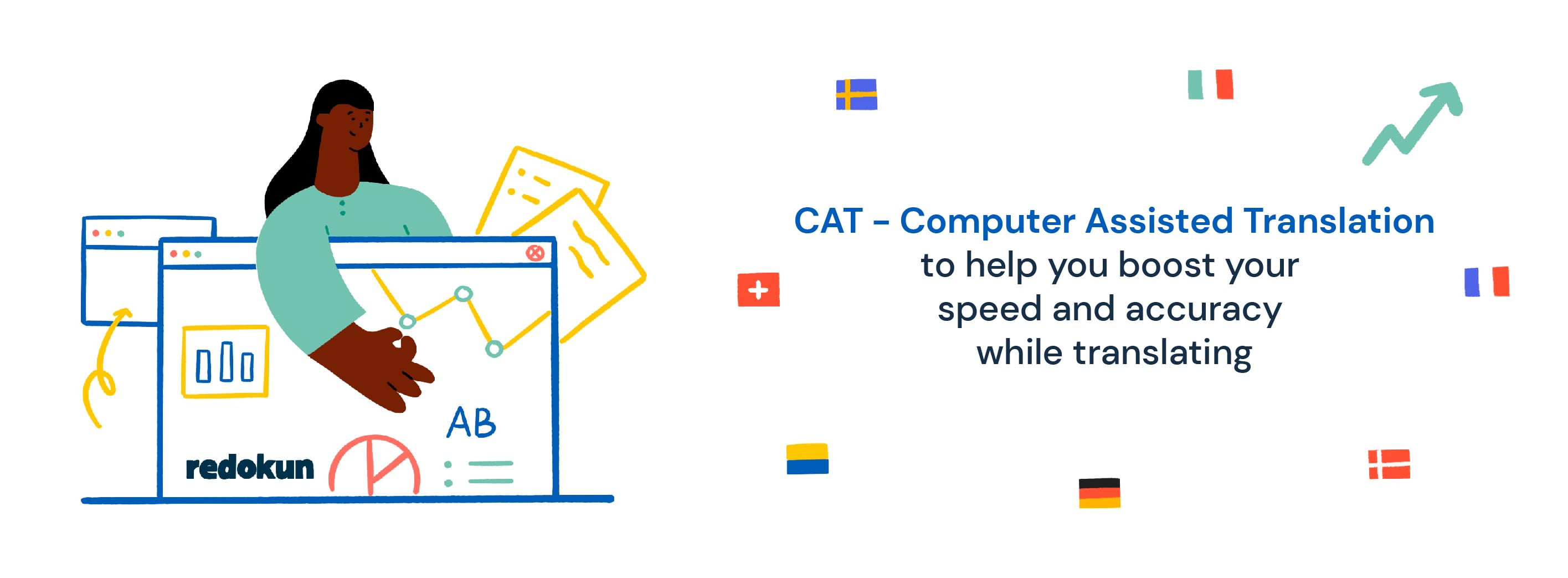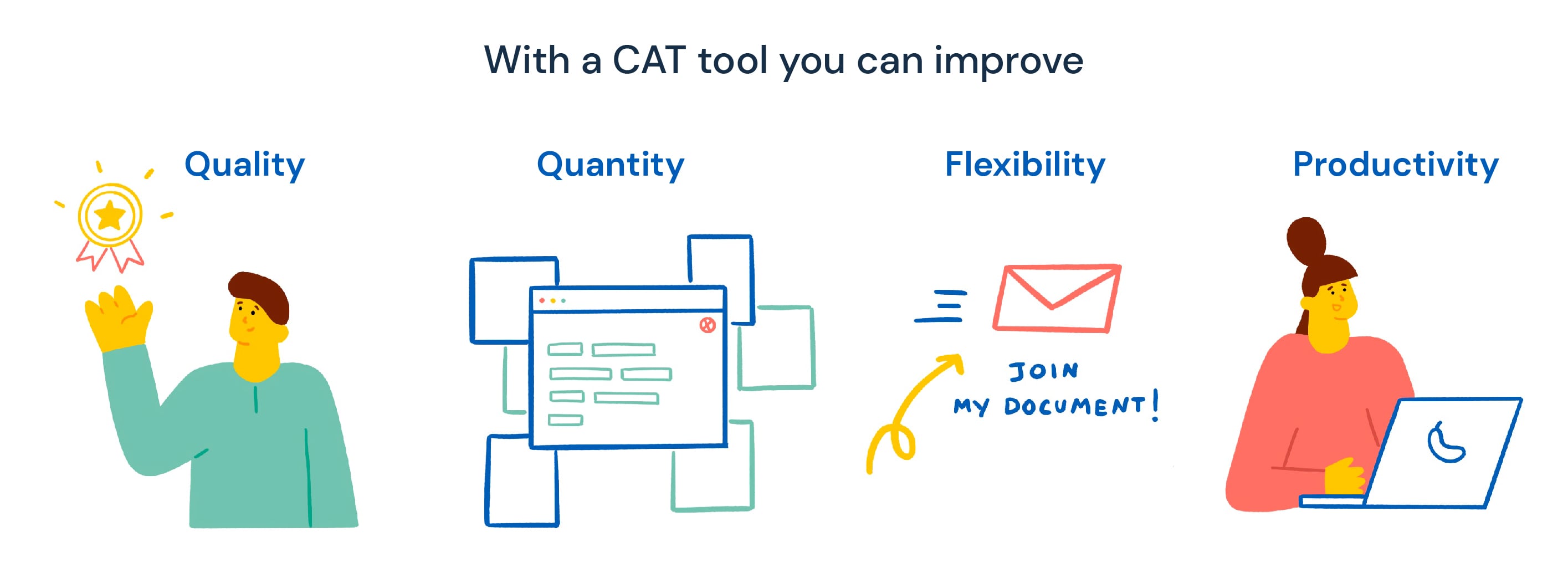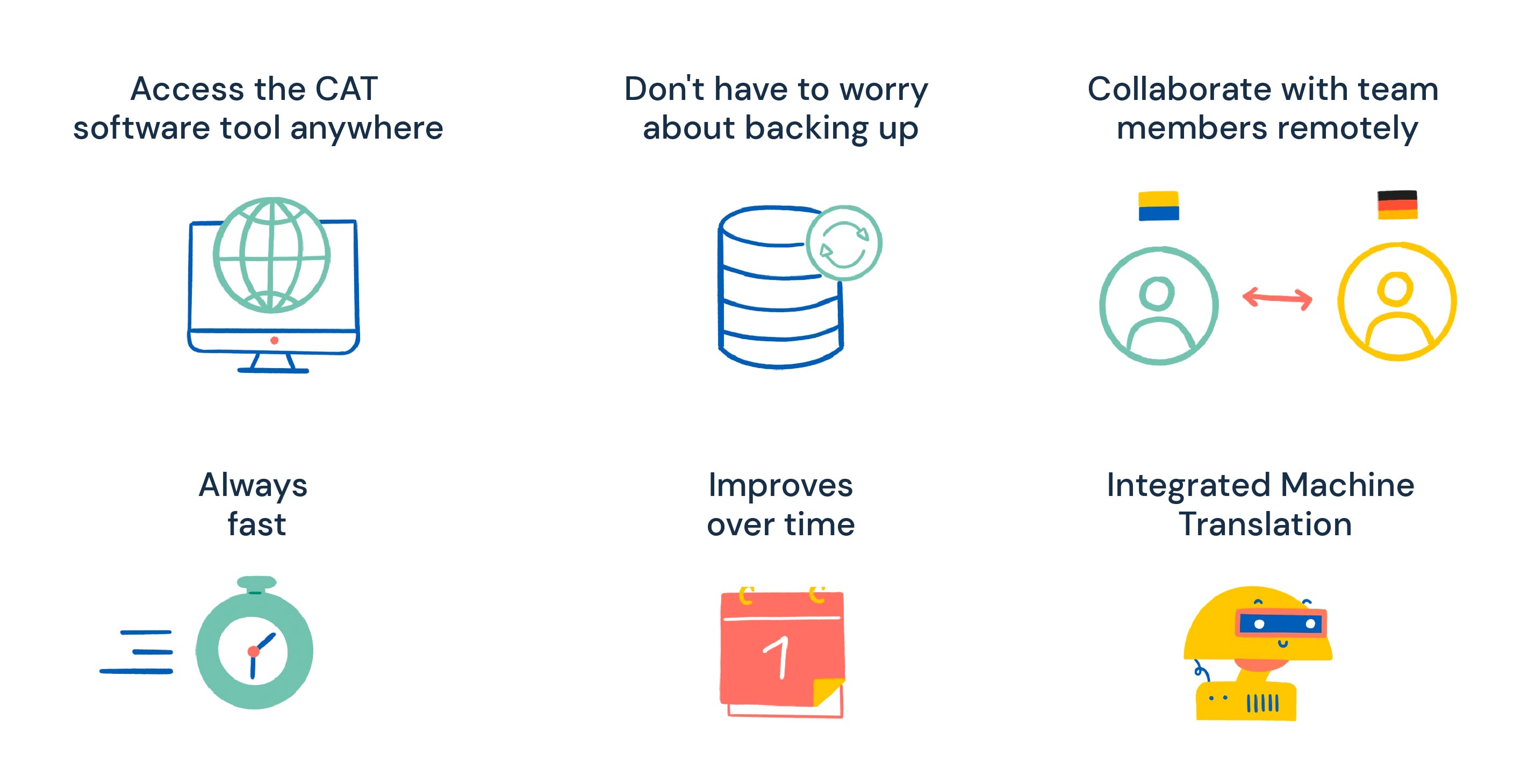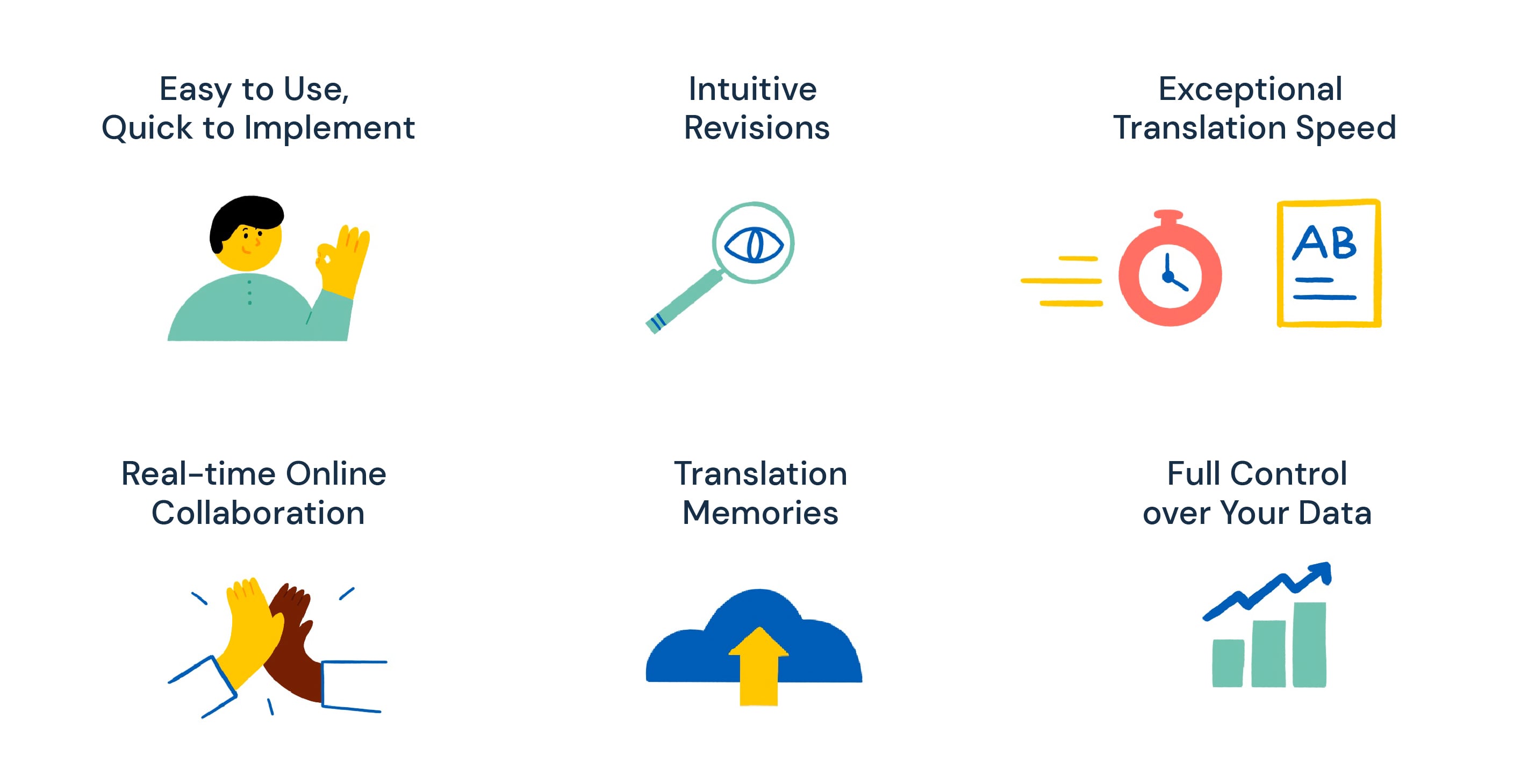Overview
- What is a CAT tool?
- Why do I need a CAT software tool?
- How does a CAT tool work?
- Can you show me an example of a CAT tool?
- What are the essential features according to translators?
What is a CAT tool?

The term CAT is short for Computer-Assisted Translation. Many companies pursuing global markets use a CAT software tool to manage and optimize their localization projects.
CAT tools are a kind of software you would use to boost your speed and accuracy while translating important documents for your customers and business partners.
Need to learn how to translate the most common documents fast? Here are our step-by-step guides about translating Word documents, Excel spreadsheets, pdf files, XML documents, subtitles, and PowerPoint presentations.
Why do I need CAT software tools?

As a company with a global presence, you want to resonate with your international audiences by using effective and compelling language. Traditionally, this means hiring professional translators or even writers to produce a copy in the target language.
The whole process would often turn out to be expensive and time-consuming. In this case, a CAT tool is like a good car. Sure, you can walk to your destination, but a good car will get you there faster and more comfortably.
With the aid of CAT software, your translation projects will improve in three domains:
- Quality: You can deliver high-quality translations consistently and effortlessly. Tone and terminologies are especially important in professional fields involving technical, financial, or any industry-specific jargon. By referencing internal or external language databases integrated into CAT tools, you can pick up these nuances more easily and thus translate quicker.
- Quantity: When your localization workflow becomes more effortless (here is how to improve your workflow even more), you can take in more work and produce more output. At the same time, your CAT tool is also getting smarter as its Translation Memories expand. This is the database you can use to leverage previous translations to translate similar projects more efficiently (read all about its benefits here).
- Flexibility: You can invite anyone you want to translate your document using the online CAT software. They don't necessarily have to be a professional translator. They can be your internal team members, resellers, or partners with some language skills. Simply pre-translate a document for them using the built-in machine translation engines ( and translation memories). Now all that's left to do is to proofread the text rather than translate it from scratch.
- Productivity: Stop copy-pasting translations to a template! It’s tedious, prone to mistakes, and you might need to hire a graphic designer to do it. Rather than wasting time on typing, editing, and formatting a document, you can focus on translating the parts that need to be translated. Your CAT tool will handle the rest and generate a clean copy of your original file once you're done.
Facing other common translation problems too? Here are the 5 most common ones and even more importantly - how to solve them.
The bottom line is that CAT tools improve translation speed, accuracy, and consistency significantly. Not only does this reduces translation costs, it also saves you from spending resources on post-editing.
How does a CAT tool work?

CAT tools are either installed as a desktop application or accessed online through a web browser (also known as cloud-based). In today's work climate, most companies go for more advanced cloud-based solutions rather than locally installed apps. Here are the reasons why:
- You can access the CAT software tool anywhere. No need to acquire separate licenses for every device you'll use.
- You don't have to worry about backing up your files. The CAT tool is essentially your company's Google Drive for translation projects.
- You can manage your tasks and collaborate with team members remotely.
- The CAT tool is always fast because it doesn't depend on your machine's specs as much. And it doesn't take up space on your local storage either.
- Your online CAT tool improves over time as developers roll out new updates regularly.
- For a more efficient translation process, you can refer to machine translations integrated within the CAT software tool.
Can you show me an example of a CAT tool?
Yes! To give you a better idea of CAT tools in action, we’ll use Redokun as an example. Let’s say your company needs to translate and distribute a brochure for foreign markets. The manual could be a Word document or an InDesign file.
STAGE 1: First, you will launch Redokun on your browser, upload the manual, and select the target languages for the project. Then, you can invite your in-house team or external vendors to access the file remotely for translation.
On your end, you can easily monitor the status of each language pair as shown here:

STAGE 2: Once they receive your invite, your team can start translating the file immediately using Redokun's web editor. The CAT tool automatically organizes the document into tidy text segments. They can review each segment and its corresponding translation box side-by-side.
As you can see below, past translations and machine translations (MT) show up as suggestions under the text boxes. Your team member can click on them and edit if necessary.

STAGE 3: Once the translation is complete, all you need to do is to download the file from Redokun. No need to copy-paste the translated text into a template in InDesign or Word. Redokun will deliver a clean copy of the translated manual in the same styles, design, and layout as your original document. Ready for publication and distribution!

Do you work with translation vendors? Find out how you can implement Redokun in your workflow for better performance.
6 Essential Features of CAT Tools According to Translators

Depending on your enterprise needs, some CAT tools will serve you better than others. Nevertheless, most businesses will agree that the following functions are essential for a productive multilingual workflow.
1. Easy to Use, Quick to Implement
A complicated software is a counterproductive software. Skip the time-consuming training and tutorials by choosing a CAT tool like Redokun. You and your team will get the hang of things in no time.
2. Intuitive Revisions
How often do you need to update a document after it has been translated into several languages? Pretty often... and pretty troublesome, right? You'll probably need to retype and update the files for each language manually.
Here's a feature we've put a lot of work into to help you simplify this process. Simply upload the updated source file to Redokun and it will automatically mark the new text for translation across all your target languages. The rest of the translated document stays the same. Learn more about this feature here.
3. Exceptional Translation Speed
Your team can go through localization projects significantly faster. They save time by referencing a database when translating text segments that are pretty straightforward or have been translated in the past. Their work also becomes much more consistent and higher quality, which yields a greater return on investment for your company.
4. Real-time Online Collaboration
With a cloud-based CAT tool, your team no longer needs to send each other a tsunami of emails and DMs about different projects. Redokun serves as a centralized hub for your multilingual assets, ensuring that everyone involved in a project is always on the same page. No more confusion about who’s doing what now and which attachment is the latest version.
5. Translation Memories
Without going too much into translation mumbo-jumbo… Translation Memories enable the CAT tool to learn and suggest relevant translations for future projects. This allows your team to streamline the process of translating high-volume, industry-specific documents. If you deal with technical, legal, and scientific jargon, this feature is absolutely necessary.
6. Full Control over Your Data
With Redokun’s project management platform, you can monitor and control who can gain access to certain data. Companies use this feature to ensure private and confidential information doesn’t fall into the wrong hands.
If curious - here is a list with 11 Translation software features divided in five different groups.
Summary
Overall, CAT tools are smart assistants that help global businesses get through their multilingual workflow with greater ease. While most translation software requires a subscription, you actually save more by eliminating the need for post-editing and layout fix-up (if interested here is a complete translation software resource hub that will help you clarify things even more and even more - how to choose one).
For businesses with extensive localization needs, I definitely recommend getting a CAT tool that is easy to use. It doesn't matter if your company has a certified translator or not, because anyone on your team can use it to translate a file in no time.
With the power of AI and Translation Memories built into the CAT software, you just need one person to proofread the pre-translated text... and voilà! Your files are ready for circulation.
I'd say this is the embodiment of "don't work hard, work smart".
Till next time,
Shu Ni
Ready to level up your localization game? Try Redokun for free today! No strings attached.





